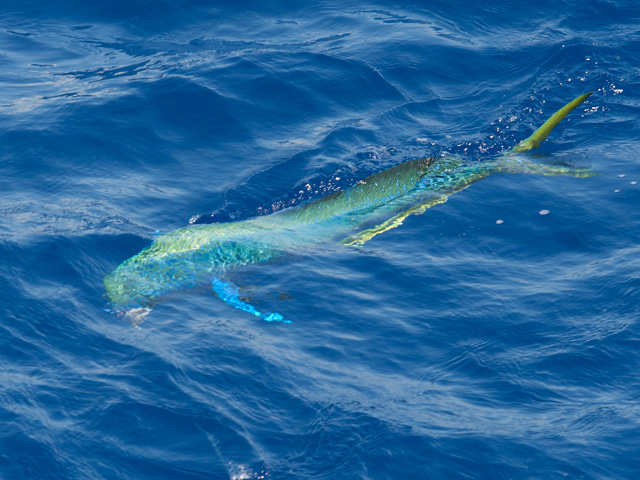The colorful and popular dolphin knows many names. Called by many on the U.S. East Coast simply "dolphin, " on the West Coast and in Spanish-speaking countries most anglers use the Spanish name "dorado" which translates to "golden." The fastest-growing name, thanks to restaurants that don't want to scare off customers with a 'dolphin sandwich' on the menu, is the Hawaiian term "mahimahi. " Known by scientists as Coryphaena hippurus, the IGFA refers to "dolphin fish" in its world record database.
Whatever you call them, this species is a favorite with offshore anglers. They are abundant throughout the world's temperate oceans, they are easy to target and because they grow quickly and aren't laden with mercury, you can eat them with a clear conscience.
Dolphin are a pelagic, migratory fish that are constantly on the move. They grow extremely fast and reach sexual maturity at just five months of age. Because they mature so fast, and reproduce prolifically, this is one pelagic species that has not been devastated by over fishing. While they are targeted worldwide, the species as a whole has sustained the pressure better than most of the pelagics. There is still much to learn about the overall distribution and worldwide population of dolphin fish.
Adult dolphin have been caught as far north as Maine, but their distribution depends greatly on warm water currents such as the Gulf Stream and its associated eddies that spin off into the Northeast canyons. Dolphin can be found in water ranging from 70 to 85 degrees F, but they prefer water temps in the mid-70 range.
Male dolphin, called 'bulls,' grow larger than the females or 'cows.' The bull has a vertical forehead and often travels with a few cows. Dolphin are extremely fast swimmers, hence their ability to take large jumps and greyhound across the ocean surface. While a 40-pound bull is a solid catch on any day of the week, these fish can grow much larger. The current all-tackle world record is an 87-pound behemoth caught off Costa Rica in 1976.
This species is noted both for its acrobatics and its colors. Each dolphin showcases different color patterns. When alive and fired up, the fish will flash rich iridescent blues and greens, while some go nearly all white with flashes of blue. The silvery white bellies contrast with the fish's bright sides and dorsal area which are sprinkled with a mixture of dark and light spots. The dorsal fin is rich blue, and the anal fin is golden or silvery. When they're 'lit up,' you can't miss a dolphin popping up in the trolling spread behind the boat. Their colors also make mahi a popular mount for restaurants and anglers. Thankfully, you don't need to kill your fish these days to get a mount of it. Just some measurements will do.
TARGETING DOLPHIN
Finding dolphin is all about finding floatsam. Just about anything you find floating in the ocean will hold dolphin. In the Southeast and Gulf of Mexico, dolphin are almost always associate with weedlines that form on the surface of the ocean. Crews will troll alongside the weedlines, or cruise the line of floatsam with a man in the tower looking for big fish under portions of weed. When you find patch of grass with fish, slow the boat and toss a live bait, swimming plug or even a fly to the fish. On the West Coast, mahimahi are often caught under kelp paddies.
Whenever you find something floating in the water, you want to check it out. Floating appliances, tires, logs, Styrofoam, buoys and Fish Aggregating Devices (FADs) are all prime targets. This little havens in the ocean provide a hiding place for small baitfish and kick off a chain of life going from microorganisms all the way to apex predators.
Once you locate a school of dolphin and hook one, keep that fish in the water at the side of the boat. The rest of the school will usually take note and follow their buddy right to the boat. It doesn't always work this way, but you want to keep at least one fish in the water at all times when balling dolphin. If the entire school decides park it under the boat, get ready for some of the most fun you can possibly have with a fishing rod. Bust out the chunk bait and give everyone a rod rigged with nothing more than 60-pound leader and 3/0 to 6/0 hook. Good luck keeping all of the hooks baited as the bite will open up. This is the perfect situation for kids.
When trolling for dolphin, just about any lure will work, however jet heads, small chuggers and feather jigs or Sea Witches are some of the more popular choices. Crews in the Mid-Atlantic almost always target dolphin with a combination blue-and-white Iland lure or Hawaiian Eye rigged with a dead ballyhoo. This is probably the best combo to target mahimahi with, no matter what ocean you find yourself on. Dolphin feed heavily on flying fish, and they like that blue-and-white color combo. Never leave home without a few mahi jigs in the box. You just might need one to save the day.








